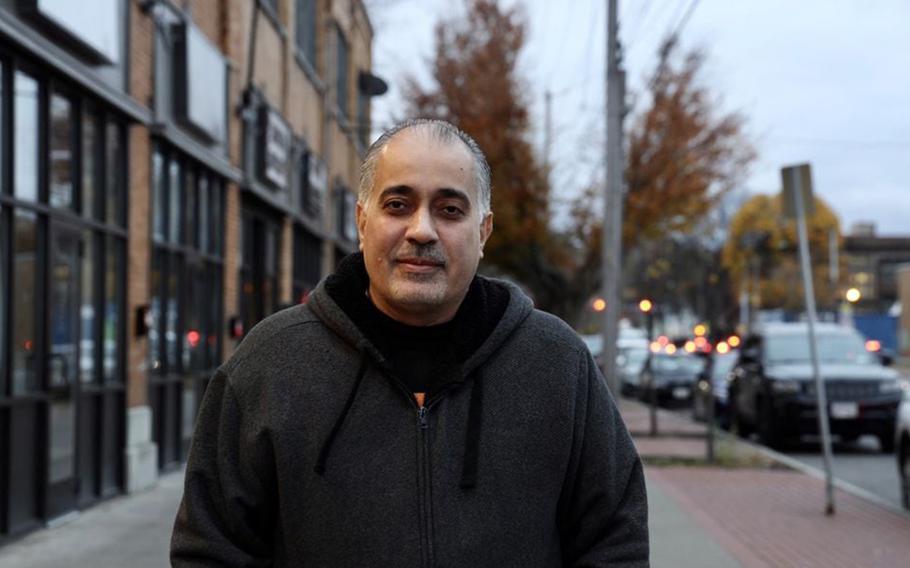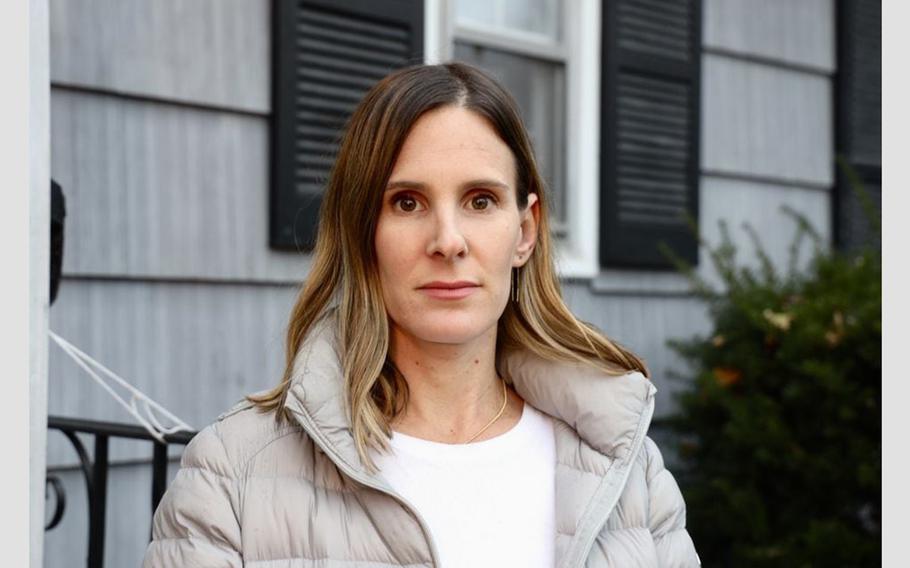
Hesham Abo Moustafa is a Syracuse man with family members in danger in Gaza. A Palestinian, Moustafa went 10 days without hearing from his cousin. (Melissa Newcomb/syracuse.com/TNS)
(Tribune News Service) — Hadas Golan woke up at 6 a.m. on Oct. 7 with a cough. She got out of bed and stepped into the darkness of her house in DeWitt to get medicine before getting back into bed.
Her phone lit up in the dark. It was her friend calling from Israel.
“Maybe she’s calling by mistake,” Golan thought to herself. “She knows it’s too early for a phone call with the time difference. I’ll call her later.”
Golan watched from her bed as the phone next to her continued to light up over and over again. She grabbed it and stared at dozens of WhatsApp notifications from her family and friends in Israel.
In Kfar Aza, the kibbutz that she grew up in just miles from Gaza, the alarm signaling a rocket attack had gone off. Her brother, his wife, and their 18-month-old daughter were hiding in their safe room. Her parents, who lived close by, were hiding in theirs.
A month later, Hesham Abo Moustafa, a Palestinian, scrolls through his phone in his Syracuse home just miles from Golan’s. He is looking at photos from his cousins who are in danger in Gaza.
“I’ve tried to reach him for the past ten days,” Moustafa said. “But I can’t because there has been no internet there, no communication. Then finally I talked to him for five minutes, but I couldn’t hear him well and it disconnected.”
Golan and Moustafa are among the thousands in America with direct ties to the violence in Israel and Gaza.
Hamas’s Oct. 7 attack that killed around 1,200 Israelis has fueled over seven weeks of continuous warfare. Over 11,000 Palestinians have been killed since, according to the Gaza Health Ministry.
Though they seem to represent opposite sides of the conflict, Moustafa and Golan understand what the other is going through.
They know the feeling of staring at a phone in anticipation, waiting to find out if their family is alive.
They know the feeling of guilt for having children who are safe, housed, and fed.
And although they represent different religions, they each are praying for peace for both Palestinian and Israeli civilians.
“We are human. They are human. We deserve to live. They deserve to live,” Moustafa said. “All the kids go back to school. People can live in their own houses again.”
“I’m really sorry for them” Golan said of Palestinian civilians. “We want this to stop. We care about each other. We don’t want this to happen to anyone. We want to live in peace.”
Golan’s experience
On the morning of Oct. 7, Golan scrolled through her phone messages alone in horror and pieced together the situation in Gaza. Her husband and three children, ages 2, 4, and 6, were asleep.
Hamas terrorists had paraglided down from the sky. They were massacring civilians and destroying houses.

Hadas Golan Kord is a Syracuse local that has family members who were injured in Israel. (Melissa Newcomb/syracuse.com/TNS)
Golan’s brother texted that he could hear the shots being fired, bombs going off, and people speaking in Arabic. He could hear it getting closer.
Golan could hardly breathe as she read the last message she would receive from her brother for two hours.
“They are in our house,” he texted. “We love you.”
Golan spent the day in bed with her eyes glued to her phone, agonizing over whether her family was alive. After waiting 20 hours in their safe room, her parents were safe.
In what Golan describes as a “miracle,” her brother and his family had survived the Hamas terrorists lighting their home on fire and throwing explosives to force them out of the house.
The couple huddled together in the shower, shielding their baby, as the fire blazed around them. With over 50 percent of their bodies burnt, they fled to safety just in time to catch a military helicopter that was leaving for Sheba Hospital, her brother told Golan.
Finding comfort in Syracuse
Golan and her family moved from Israel two years ago to live in Seattle while her husband completed his physician fellowship. Just two months ago, they moved to Syracuse when he got a job at Upstate University.
It was not an easy move for Golan, who had grown accustomed to having a “large, warm, supportive” Israeli community in Seattle.
“When we knew we were coming here, I immediately started checking if there are more Israelis. And very fast I understood that that’s not the case,” Golan said.
Once she was in Syracuse, she went to the Jewish Community Center and saw that there was a Jewish community ready to welcome her with open arms.
“People were very supportive immediately,” Golan said. “There are not a lot of Israelis but they love Israel and they want to support Israel. So when an Israeli family is coming, they want to help us feel at home.”
She began getting coffee with a group of mothers and her kids now had friends in the community. Her eldest son began attending school at the community center.
After the attack, people from the community center began checking in. When they found out what happened, they sprung into action.
“Somebody came to me saying Hadas needed the extra child care,” said JCC Executive Director Marci Erlebacher. But the program was already full.
“Then I heard, unfortunately, her story and what was going on. I knew we had to give this woman support. That’s what we are as a community,” Erlebacher said.
They welcomed her children into the program and brought on an extra staff person and extended hours when needed. Others organized bringing meals to her house.
“We were going to make it happen. Make Hadas’s life a little easier, despite the hell that she was going through,” Erlebacher said.
The community center is hosting Psalm readings each Monday night where people can get together, pray, and talk about how they are feeling as the war continues.
Golan feels guilty that as her family, friends, and innocent people experience violence that she is living in the United States, safe from the conflict.
“We’re here and we’re sleeping in our beds and our life continues and they are there. What can I do? I feel really useless,” Golan said.
Moustafa’s experience
Moustafa’s cousin has three boys and two daughters. Their eldest son, 21, is paralyzed and nonverbal.
They live in Khan Yunis, the second largest city in Gaza. Moustafa never lived in Gaza, but visited his family frequently.
Khan Yunis has been a target for air strikes and white phosphorus chemical attacks. A rocket hit the home next to them, leveling it, his cousin told Moustafa in a text. But due to their son’s condition, they cannot transport him to leave the area.
Around 30 Gazans, including some children, are also seeking shelter in the house.
Earlier this month, Moustafa’s cousin left the house to search for food when a rocket hit the ground near him. Pieces of rock went into his leg but he was able to remove them and bandage himself, the cousin texted.
Moustafa works at St. Joseph’s Hospital as a lab technician and at a cell phone store.
He attended a pro-Palestinian march in the city organized by the Syracuse Peace Council on Oct. 28 in Clinton Square.
The council is calling for a ceasefire, a stop to military aid to Israel and an increase in humanitarian aid to Gaza, according to steering committee member Diane Swords.
The peace council is also in the process of finding a way that people can send money and humanitarian aid directly to civilians in Gaza.
Moustafa fears for his injured cousin’s life and for all of the people who rely on him. But from thousands of miles away, there isn’t much that he feels can be done to help.
“It hurts me and it hurts my feelings because I have kids and I have a wife. And when I see my kids are hungry, the first thing I do is get them something,” Moustafa said. He knows that is not always possible for his family in Gaza.
Watchdog/Public Affairs reporter Melissa Newcomb covers education, including Syracuse University and the city schools. For tips, contact her anytime at mnewcomb@syracuse.com, 315-679-1068, or @melissarnewcomb on Twitter.
©2023 Advance Local Media LLC.
Visit syracuse.com
Distributed by Tribune Content Agency, LLC.